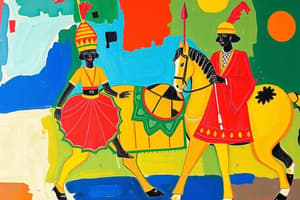Podcast
Questions and Answers
Which kingdom is noted for its cultural advancements during the early medieval period?
Which kingdom is noted for its cultural advancements during the early medieval period?
- Chola Dynasty
- Mughal Empire
- Kamrupa Kingdom (correct)
- Gupta Empire
What significant event marked the beginning of British control in Assam?
What significant event marked the beginning of British control in Assam?
- Battle of Plassey
- First Anglo-Afghan War
- Treaty of Yandabo (correct)
- Second Anglo-Burmese War
Who founded the Ahom dynasty?
Who founded the Ahom dynasty?
- Sukapha (correct)
- Chandra Kiran
- Gaurinath Singha
- Swargadeo Shiva Singha
Which festival is key in Assamese culture, celebrating the agricultural cycle?
Which festival is key in Assamese culture, celebrating the agricultural cycle?
What significant economic change occurred during the British colonial period?
What significant economic change occurred during the British colonial period?
What type of conflicts arose due to ethnic diversity in Assam post-independence?
What type of conflicts arose due to ethnic diversity in Assam post-independence?
Which river plays a crucial role in the geography and economy of Assam?
Which river plays a crucial role in the geography and economy of Assam?
Which of these languages is the official language of Assam?
Which of these languages is the official language of Assam?
What was a significant characteristic of the Ahom dynasty's military?
What was a significant characteristic of the Ahom dynasty's military?
Which industry remains significant in Assam's economy?
Which industry remains significant in Assam's economy?
Flashcards are hidden until you start studying
Study Notes
Ancient and Medieval Period
- Early Inhabitants: Evidence of human presence dates back to prehistoric times with tools and artifacts found.
- Kingdoms: Influenced by various kingdoms such as the Kamrupa Kingdom (350 CE - 650 CE), noted for its cultural advancements.
- Religion: Introduction of Hinduism and Buddhism; the region was part of significant trade routes.
Ahom Dynasty (1228-1826)
- Founding: Established by Sukapha, the Ahom dynasty ruled for nearly 600 years.
- Military Strength: Renowned for strong military tactics and resistance against Mughal invasions.
- Administration: Developed a unique administrative system and a cohesive cultural identity.
British Colonial Period (1826-1947)
- Treaty of Yandabo (1826): Marked the beginning of British control after the First Anglo-Burmese War.
- Economic Changes: Introduction of tea plantation economy, transforming Assam into a vital province for British trade.
- Socio-Political Movements: Rise of nationalism and movements for rights among local populations.
Post-Independence Era (1947-Present)
- State Formation: Assam became a part of India after independence, later reorganized in 1950 and 1960s for statehood.
- Ethnic Conflicts: Addresses of ethnic diversity led to various conflicts, including the Bodos and the Assamese identity crisis.
- Development and Challenges: Focus on economic growth, infrastructure, and addressing issues like illegal immigration and insurgency.
Cultural Heritage
- Language: Assamese is the official language, with a rich literary tradition.
- Festivals: Bihu is a key cultural festival, celebrating the agricultural cycle.
- Arts and Crafts: Notable for handloom, including Assamese silk, and traditional music and dance forms.
Geography and Economy
- Geographical Features: Influenced by the Brahmaputra River, which plays a crucial role in agriculture and transportation.
- Economy: Agriculture remains significant; tea, rice, and petroleum are key industries.
Early Inhabitants
- Evidence of human presence is found in prehistoric times with tools and artifacts.
Kingdoms
- Influenced by various kingdoms, such as the Kamrupa Kingdom (350 CE – 650 CE).
- The Kamrupa Kingdom was known for its cultural advancements.
- Hinduism and Buddhism were introduced during this period.
- The region was a part of significant trade routes.
Ahom Dynasty (1228-1826)
- Founded by Sukapha, the Ahom dynasty ruled for almost 600 years.
- The Ahom dynasty was renowned for its strong military tactics and resistance against Mughal invasions.
- The Ahom dynasty developed a unique administrative system and a cohesive cultural identity.
British Colonial Period (1826-1947)
- The Treaty of Yandabo (1826) marked the beginning of British control after the First Anglo-Burmese War.
- Tea plantation economy was introduced during this period, turning Assam into a vital British trade province.
- Nationalism and rights movements grew among local populations.
Post-Independence Era (1947-Present)
- Assam became a part of India after independence.
- Assam was reorganized in the 1950s and 1960s to become a state.
- Ethnic diversity caused conflicts between groups such as the Bodos and the Assamese people.
- There is a focus on economic growth and infrastructure development.
- Challenges such as illegal immigration and insurgency exist.
Cultural Heritage
- Assamese is the official language with a rich literary tradition.
- Bihu is a key cultural festival celebrating the agricultural cycle.
- Assam is known for handloom, including Assamese silk, and traditional music and dance forms.
Geography and Economy
- The Brahmaputra River impacts agriculture and transportation in the region.
- Agriculture is a key part of the economy.
- Tea, rice, and petroleum are key industries.
Studying That Suits You
Use AI to generate personalized quizzes and flashcards to suit your learning preferences.



